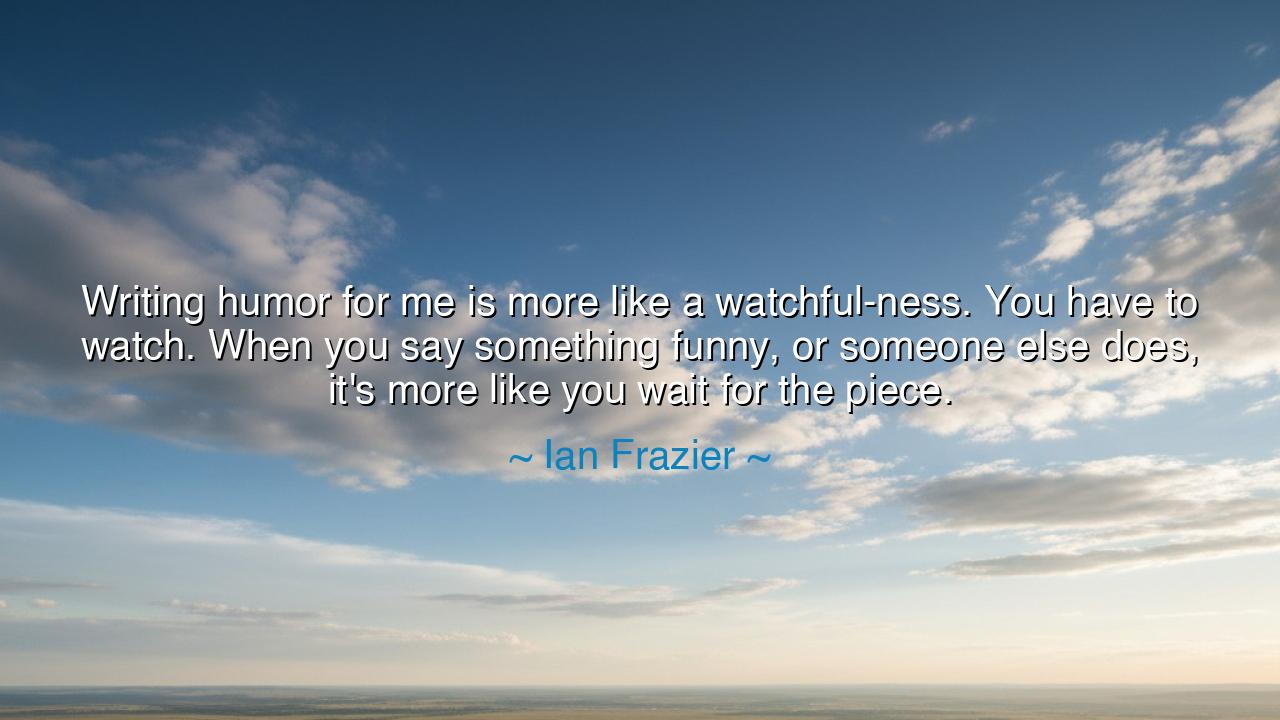
Writing humor for me is more like a watchful-ness. You have to
Writing humor for me is more like a watchful-ness. You have to watch. When you say something funny, or someone else does, it's more like you wait for the piece.






Hear the words of Ian Frazier, the quiet observer of human folly and grace: “Writing humor for me is more like a watchful-ness. You have to watch. When you say something funny, or someone else does, it’s more like you wait for the piece.” In these humble yet profound words lies a wisdom that echoes through the ages—the understanding that laughter, like truth, cannot be forced. It must be seen, not created; discovered, not declared. True humor is not a spark struck by will, but a light revealed to those who are patient enough to see the world as it truly is.
For in this watchful-ness, Frazier speaks of more than writing; he speaks of living. The ancient poets knew this truth well: that art is born not from haste, but from perception. The hunter waits for his prey; the philosopher waits for clarity; the humorist waits for the world to reveal its own absurdity. And when it does—when life, in all its contradiction and wonder, stumbles upon itself—then laughter arises, not as an escape from truth, but as its companion. The watchful one learns that to see deeply is to understand that joy and foolishness, tragedy and comedy, are threads of the same tapestry.
The masters of old were also watchers. Socrates, who seemed a fool to those around him, was in truth the wisest of men because he waited—he questioned, he listened, he allowed truth to come forth of its own accord. And Diogenes, the wandering cynic, made laughter his weapon and wisdom his shield. He did not craft jokes to mock the world; he merely held a mirror to it, and men laughed because they recognized themselves within its reflection. In this way, Ian Frazier stands in their lineage—a student of human nature who waits for the moment when life betrays its hidden comedy.
To “wait for the piece,” as Frazier says, is to understand that creativity and insight are acts of surrender. The artist does not command the muse; he invites her. The humorist does not invent laughter; he listens for it. This is the patience of the observer, the one who trusts that life will always provide material if only we are awake enough to see it. Such patience requires humility, for it admits that the world is wiser and funnier than we are. It is a letting go of control, a gentle yielding to the rhythm of existence. And in that stillness—when the noise of ego fades—the piece arrives, shimmering like light upon quiet water.
Consider the story of Mark Twain, whose humor seemed effortless but was born of deep observation. Twain would sit for hours, watching people in the taverns and on the riverboats, listening to their speech, their quarrels, their pride, their dreams. He once said, “The secret source of humor is not joy but sorrow.” In those words lies the same watchful truth that Frazier speaks of: to write humor, one must first see life’s pain and paradox, must learn to find grace even in foolishness. Twain’s laughter was not cruelty—it was compassion made audible. He waited for life to reveal its contradictions, and then, with tender precision, he captured them on the page.
This watchful-ness, then, is not only the key to humor—it is the key to wisdom. The one who watches learns to see the hidden patterns of the world. He notices how pride leads to irony, how seriousness collapses into farce, how despair softens into laughter when held with love. To be watchful is to walk through life with open eyes and an open heart, ready to be surprised by the beauty and absurdity of existence. It is to live as a poet does, alert to the music in ordinary moments—the misstep that becomes a dance, the mistake that becomes revelation.
And so, let this teaching be passed to those who seek both wisdom and joy: be watchful. Do not hurry to fill silence with words or to explain what you have not yet seen. Watch life as it unfolds; let it show you its truths. When others speak, listen not just with your ears but with your spirit. When laughter comes, do not seize it—let it breathe. For the humorist, the artist, the teacher, and the seeker all share one sacred task: to bear witness. To watch, to wait, and to see clearly enough that the truth, when it appears, can speak through them.
Thus, as Ian Frazier reminds us, laughter is not a performance but a discovery. It is the fruit of awareness, the song of the heart that sees and forgives. Be therefore patient in your watching. Wait for your “piece,” whether it be a story, a truth, or a moment of clarity. In your stillness, life will reveal itself—not as tragedy alone, nor as comedy alone, but as both, entwined in the eternal dance. And when you speak from that seeing, your words—like Frazier’s—will carry the quiet laughter of the wise, the kind that heals instead of wounds, and enlightens even as it delights.






AAdministratorAdministrator
Welcome, honored guests. Please leave a comment, we will respond soon